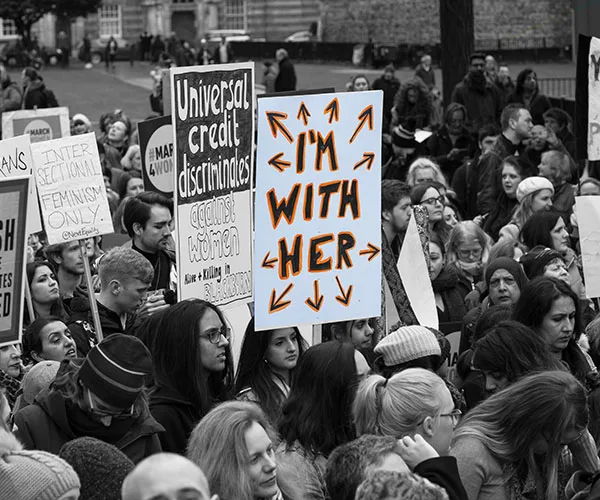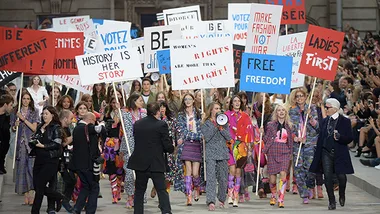Modern feminists get a bad rap – and they damn well shouldn’t.
How many times have you heard people say they understand what feminism used to be, but it’s old and outdated; we just don’t need it anymore? They say modern feminism is the problem – it’s full of rabid man-haters and we’ve forgotten what we should be fighting for; what our foremothers fought for.
And while the work of suffragettes and bra-burning feminists is integral to our current semblance of equality, the fact they’re framed as the superior feminists is perhaps misguided.
In fact, the values of many first-wave feminists would actually undermine the rights we’re still pushing for today. Some activists, like Susan B. Anthony, were staunchly anti-choice and religion was a prominent factor as to whether you were invited to the exclusive feminist circle – you best forget the right to divorce, no matter how you were treated by your husband.
It’s also no secret rights for women meant rights for white women. Prominent activist Elizabeth Cady Stanton actively fought to stop black men being able to vote, claiming it was better for a black woman “to be the slave of an educated white man, than of a degraded, ignorant black one”.
Yeah… yikes.

Second-wave feminists, while markedly better, weren’t great at intersectionality either. Minorities and transgender women were left firmly on the peripheries while feminism focussed on white viewpoints, meaning inequalities white women didn’t experience were never explored.
So while it’s important we acknowledge and celebrate the huge advancements made by our sisters of yesteryear, it’s just as important we celebrate the progress made in the now. What are modern feminists doing differently to achieve the forever allusive concept equality?
Using the internet to spur global movements
Unless you’ve been living under a particularly impenetrable rock you’ve been well-versed in the #MeToo movement, but before #MeToo there was #YesAllWomen.
The cry of “not all men” reverberates when women describe that hideous, omnipresent sense of fear sparked just by walking down the street alone. And sure, not all men are creepy or inappropriate, but all women have been made to feel uncomfortable at some point and shifting the focus from that to “poor men” is a disservice to everyone.
The importance of global movements, done from the comfort of our own homes, mean women who have been harassed or assaulted can be invigorated by the knowledge they’re not alone. Discovering this is a global epidemic creates a communal support network which helps some women to feel more emboldened and speak out, removing yet another ever-present barrier to equality.
Calling out rape culture
The word ‘rape’ elicits a visceral reaction; it’s confronting and guttural, but that’s why it’s important to acknowledge ‘rape culture’. The phrase doesn’t necessarily pertain to rape as such, but to the prevailing social attitudes which either normalise or trivialise sexual assault and abuse.
Rape culture isn’t something that exists in far-away countries we can comfortably pity from here. It’s deeply ingrained in our Australian culture and it’s thanks to modern feminists we were able to remove some of the stigma surrounding sexual assault.
One in five women will experience an attempted or completed rape, a terrifying statistic. But it’s only been thanks to an ongoing fight from feminists that survivors have the language to label their sexual trauma.
We’ve seen young feminists push for more to be done about rape culture at colleges. Kendra Murphy recently told 60 Minutes she was raped at St Andrews College at the University of Sydney in 2014 as a part of a disturbing hazing ritual.
“It’s this really bizarre, entrenched culture that the colleges will never get rid of. There can be as much reform as you want but that essence will still be there and that’s what the issue is,” she explained.
“I think they [the colleges] should be disbanded.”
Often, people need facts and figures to “prove” we’re experiencing an epidemic, but when it comes to sexual assault against women, we have stats coming out of our ears. We know one third of us will be sexually assaulted at some point, and still, women are branded hysterical while eyes roll whenever rape culture is mentioned.
Without modern feminism, we’d be back to pretending it doesn’t happen.
Feminism around the globe
While gender equality is still a necessary fight in every country, it would be naïve to say some don’t need it more than others. In Saudi Arabia, women aren’t allowed to use public swimming pools while Iranian women have been protesting the obligatory Islamic headscarf in public.
As a result, women-led organisations, like El Karama, emerged to fight blatant sexism present in the countries and have been instrumental in the Arab Spring restructurings and pushing women’s rights.
El Karama pushes to cancel, or at least reform, discriminatory laws and practices against women, and their recommendations have been adopted by constitutions as well as ratified by international bodies like the UN.
Women’s rights activists have also been integral to combatting inequalities in Middle East and African countries, including several proactive anti-harassment campaigns in Egypt.
Women were being sexually assaulted by mobs on the streets of Egypt. As one Egyptian women’s rights activist put it, “We do not want to use the term ‘harassment.’ What is happening today is sexual terrorism.”
Feminists reacted by inventing a program called HarassMap which focuses on outreach and prevention efforts.
“We want people to say, ‘This will not be tolerated. This doesn’t fit with our Egyptian values or our tradition or history. It’s a new trend and it has to be stopped,” Co-founder Rebecca Chiao said.
Shining a light on domestic violence
Violence against women is sexist. While some may blame socio-economic factors or cultural attitudes, which can certainly be contributing factors, at the end of the day domestic violence is a display of control and power. It’s about the dominance of men and the belittling of women, something we’ve been conditioned to accept since birth.
While feminists from yesteryear may have been more reluctant to call out violence in their home, modern feminists have shone a light on the terrifying statistics. In Australia, one in three will suffer domestic abuse and two women will be murdered each week.
While we’re far from fixing DV, confronting it head-on with the right language is priceless. In countries, like Turkey, where society is far more accepting of domestic violence we’ve seen female TV presenters using their platform to condemn it.
“In Turkey it’s the patriarchal power relationship. When there is an issue of power in a family or relationship, violence will be in the middle,” said Meltem Agduk, Gender Project Coordinator for UNFPA Turkey.
“If the gender stereotypes continue like this violence against women will always be with us.”
It’s what many modern feminists have said time and time again – gender equality is the root of many a societal issue and they’ll only be solved when we have true equality.
Women in STEM
Getting women in the workforce is definitely something we can thank our former feminist allies for – that, and the world wars – but there’s still often clearly male-dominated fields women struggle to crack into.
One such field is STEM: Science, technology, engineering and math. Modern feminists have been fierce advocates for steering girls into the field historically filled with men, including former First Lady Michelle Obama.
“If we’re going to out-innovate and out-educate the rest of the world, we’ve got to open doors for everyone,” she said. “We need all hands on deck, and that means clearing hurdles for women and girls as they navigate careers in science, technology, engineering and math.”
STEM jobs also typically see women experience a smaller wage gap relative to men and earn 33 per cent more than those in non-STEM occupations. Lessening the wage gap and improving base rates for women is instrumental to equality, so big shout out to modern feminists for removing barriers for girls.
So next time someone tells you modern feminism ain’t worth a dime, send them to this handy listicle and remind them this is only five – we could go forever.




